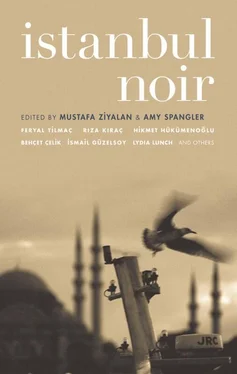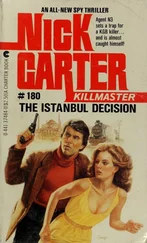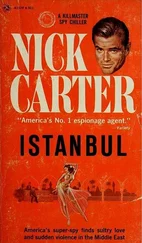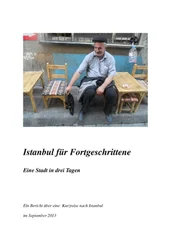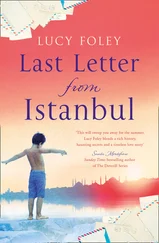Unable to come up with a better idea, she politely placed the wedding ring on the edge of the table.
“We should celebrate,” the man said.
“But you haven’t drunk your tea,” Cemile Abla quickly objected. “It must be ice cold by now.”
The man downed the tea in a single gulp and excitedly began making plans. “Let’s go out for a nice dinner, if you’d like. Look, we’re in luck, there’s a full moon out tonight. We have to celebrate, and we have to do it right. We can’t go just anywhere. Let’s go to your favorite restaurant...”
She had to wait a few more minutes before the medicine began to take effect. But Cemile Abla was tired of talking. “Have you ever thought about what happens to us after we’re dead, Timur Bey?” she finally asked, desperately wanting to change the subject.
Though thrown off guard by the question, Timur Bey did his best to respond, as courtesy demands. “Unfortunately, I’m not really able to perform the duties of our religion as well as I should. But still—”
“I think it’s going to be wonderful. We’ll float in an endless sky like white balloons. Now and then we’ll come together and form great big, even more beautiful clouds, then we’ll split up into small pieces again and glide off in different directions. We’ll wander in circles around a soothing light, and nothing will have a beginning or an end.”
Timur Bey struggled to keep his eyes open, fighting the dead weight of his eyelids. He tried to spring to his feet, but failed. When he asked in a barely audible voice where the bathroom was, Cemile Abla got worried. If the man locked himself in the bathroom, she would have a nasty situation on her hands. She would have to break down the door. But Timur Bey was already on his feet, staggering toward the dining room door.
“I just need to wash my face,” he mumbled. “It’s just because I’m so happy, I guess...”
As soon as he reached the hallway, he collapsed to the floor. Cemile Abla, who was just a few paces behind him, took a deep breath of relief. How nice that Timur Bey had already made it halfway to the bathtub all by himself.
Two hours later, as she once again wrapped her knives, scissors, and meat cleaver up in their cloths and returned them to their drawers, three large, black trash bags stood in front of the kitchen door.
The mother of the first of the two stubborn groom candidates had somehow gotten Cemile Abla’s telephone number and called less than a week after her son went missing. Her voice undulated with concern; she found the situation humiliating, that she had to talk with Cemile Abla under these conditions, when they hadn’t even met, but she had no other choice. “Well, I tell you, I’ve been really worried myself, ma’am,” said Cemile Abla. “I made all these preparations. I thought to myself that a man like your son, a man from such a good family, would at least call and let me know that he couldn’t make it. But unfortunately, I haven’t heard from him at all. And I had to give all those pastries and cakes to the neighbors’ kids.”
That night, she thought that she’d be able to carry the bags, which stood lined up in front of the kitchen door, by herself; she might not be able to carry them all at once, but certainly she was strong enough to take them out one by one. But her knees were so sore that she gave up after dragging the first bag down the hill. “There must be an easier way to do this,” she mumbled, when the solution struck her — Captain Hasan. She headed down the shore and found him sitting on a stool just on the other side of the pier, puffing on a cigarette as he gazed upon the lights of distant ships. Just as she had guessed he would, Captain Hasan got up from his seat without asking a single question, without waiting for any explanation, in fact, without even the slightest glint of curiosity in his eyes. He ground his cigarette beneath his foot and followed Cemile Abla over to the bottom of the hill. First they carried the bag she had brought down to the captain’s boat, then they went to her home and grabbed the other two bags. Even Captain Hasan had run short of breath; using the sleeve of his shirt, he inconspicuously wiped away the beads of sweat that had gathered on his brow from all the climbing.
“Don’t you worry, Cemile Abla,” he said with a grave expression once they had made their final descent. “I’ll drop these straight into the current at the mouth of the Bosphorus. Nobody will know.”
When they ran into one another around noon three days later, they didn’t mention it; Captain Hasan just shook his head as if to say, Mission accomplished . And though she could hardly conceal her curiousity, Cemile Abla never asked: Had he simply dropped the bags into the strait, or had he untied them and dumped out the contents?
Thankfully, nobody called to ask about the second potential groom. And this time around Cemile Abla was more experienced; she didn’t even attempt to carry down the three large, black bags she’d set in front of the house. She went straight down to the shore and found Captain Hasan. She didn’t need to say a word; she gave him a certain look, and he immediately understood that she needed his help once again. Captain Hasan seemed to handle the bags with more ease this time; in only fifteen minutes he had taken all three down and loaded them onto the boat without shedding a single drop of sweat. “I should set off before sunrise,” he said. “I’ll take care of these and then come back and pretend I forgot something and pick up that lazy-boned boy.” The car-fanatic apprentice had just started work earlier that week.
When Cemile Abla got down to the shore, she found four fishermen settled in front of one of those hollows in the Hisar walls covered by iron bars; they were conversing in low voices, their eyes turned to the waters painted orange by the moon-light. When she reached them they greeted her as joyously as ever; she accepted their invitation to join them and sat down on the edge of a blanket. They chatted about this and that as she sipped the rakı in her tea glass. For a moment her eyes met those of Captain Hasan. Cemile Abla turned her head before anyone noticed, and began telling a funny story about her father. She was sure that the captain understood.
When she got home, she began trying to tape the cover back onto an old book, just to pass the time. It was an hour before sunrise when she heard the light knock at her door.
“You’ve got some packages that need to go down, Cemile Abla?” Captain Hasan asked. His cheeks were red from the rakı.
“I hate to trouble you...”
“No reason for you to come out, I’ll take care of it.”
Because she knew that he was too bound by the rules of etiquette to come inside, Cemile Abla dragged the bags to the front door herself. She was in a cheerful mood, relieved at not having to climb repeatedly at the crack of dawn. When she went to the living room to open the curtains, a tiny glinting object caught her eye. She had picked up the tea glasses, plates, forks, and knives earlier, but the wedding ring was still there on the edge of the coffee table. She thought about what she would tell Nalan. She was sure her telephone would ring before the clock struck noon; in fact, she wouldn’t be surprised if Nalan came all the way over here just to gossip face to face.
“I guess I’m just not meant to marry,” she’d tell her friend. “They all just slip right through my fingers. It’s as if, just when it’s all about to happen, poof, they evaporate into thin air, just like that. Don’t get me wrong, I’m not taking you for granted, but please, let this be the last one,” she’d say. “Don’t introduce me to anyone else. Really. You think I’m not saddened by this, but really, it weighs so heavily on my conscience.”
Читать дальше
